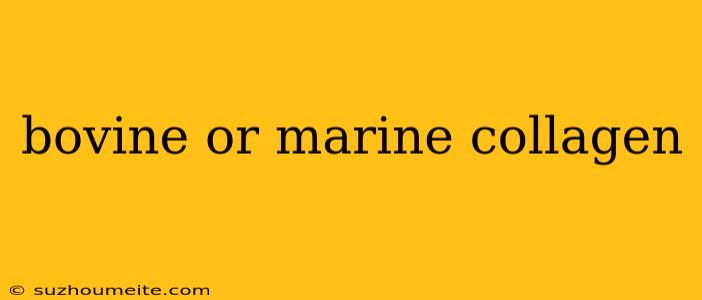Bovine vs. Marine Collagen: Which One is Right for You?
Collagen is a protein that is found naturally in our bodies and is responsible for giving our skin, bones, and joints their structure and strength. As we age, our bodies produce less collagen, which can lead to wrinkles, joint pain, and other signs of aging. Collagen supplements are a popular way to boost collagen levels and potentially improve these issues.
Two of the most common types of collagen supplements are bovine collagen and marine collagen. Both types offer potential benefits, but there are some key differences between them.
Bovine Collagen
Bovine collagen is derived from the skin, bones, and tendons of cows. It is a good source of Type I and Type III collagen, which are the most abundant types of collagen in the body.
Benefits of Bovine Collagen:
- Supports skin health: Bovine collagen may help to improve skin elasticity, reduce wrinkles, and increase hydration.
- Promotes joint health: It may help to reduce joint pain and stiffness, particularly in people with osteoarthritis.
- Boosts hair and nail health: Bovine collagen may help to strengthen hair and nails, reducing breakage and promoting growth.
- May improve gut health: Some research suggests that bovine collagen may help to improve gut health and reduce inflammation.
Possible Drawbacks:
- Allergic reactions: Some people may be allergic to bovine collagen, particularly those with a dairy allergy.
- Potential for contaminants: Bovine collagen sourced from cows raised in certain regions may be contaminated with hormones or antibiotics.
- Not suitable for vegetarians or vegans.
Marine Collagen
Marine collagen is derived from the skin and scales of fish. It is also a good source of Type I and Type III collagen, but it also contains Type V collagen, which is found in the skin and blood vessels.
Benefits of Marine Collagen:
- High absorption rate: Marine collagen is thought to be more easily absorbed by the body than bovine collagen due to its smaller molecular size.
- May improve skin elasticity: Marine collagen may help to improve skin elasticity, reduce wrinkles, and increase hydration.
- Supports joint health: It may help to reduce joint pain and stiffness, particularly in people with osteoarthritis.
- May promote healthy hair and nails: Marine collagen may help to strengthen hair and nails, reducing breakage and promoting growth.
- May help with weight management: Some research suggests that marine collagen may help to increase satiety and reduce appetite.
Possible Drawbacks:
- Fishy taste: Marine collagen supplements may have a slightly fishy taste or smell.
- Potential for mercury contamination: Marine collagen derived from fish caught in certain areas may be contaminated with mercury.
- Not suitable for people with seafood allergies.
Choosing the Right Collagen for You
Ultimately, the best type of collagen for you will depend on your individual needs and preferences. Consider these factors:
- Your dietary restrictions: If you are vegetarian or vegan, marine collagen is a better choice.
- Potential allergies: If you are allergic to cow's milk or seafood, you should avoid bovine and marine collagen, respectively.
- Taste and smell: If you are sensitive to fishy tastes or smells, bovine collagen may be a better choice.
- Cost: Marine collagen is often more expensive than bovine collagen.
Conclusion
Both bovine and marine collagen offer potential benefits for skin, joints, hair, and nails. Ultimately, the best choice for you will depend on your individual needs and preferences. Be sure to choose a reputable brand that uses high-quality ingredients and is free of harmful contaminants.
This information is for general knowledge purposes only and does not constitute medical advice. Please consult with a qualified healthcare professional before making any decisions related to your health or treatment.
